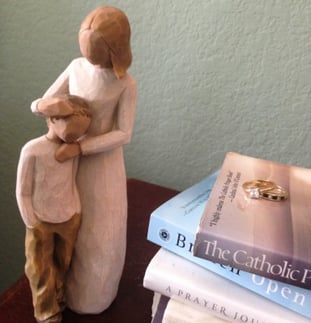“So. Not. Helpful.” I actually mouthed that, when she glanced away. In the aftermath of our son’s passing, an acquaintance mentioned that a lot of couples divorce after losing a child. 85%, she quoted. “But,” she hastily added, “I’m so glad you and your husband are Believers.” Truth: Membership in His Church is not divorce insurance. If you need a case study, read the book of Job. In the New Testament, the Sermon on the Mount doesn’t mention, “Blessed are Christian marriages, for theirs is a smooth and blissful road with no arguments over who forgot the stupid bag in the stupid kitchen trash can.” In his second letter to the church at Corinth, Saint Paul writes:
“Five times I received from the Jews thirty-nine lashes. Three times I was beaten with rods, once I was stoned, three times I was shipwrecked, a night and a day I have spent in the deep.”
It goes on about danger after danger he endured.
I wonder if Paul worried people would look at his life and think, “Jesus? Nope. No thank you.” I’ve had the same concern. People will look at my family’s loss and think our faith did nothing to protect us. They’ll think my God doesn’t care. Worst-case scenario, they may think like some of Job’s contemporaries, that we somehow failed as parents and God punished us. Who would ever want that God?
And now there’s the added pressure to have an exemplary, intact marriage after losing a child. If we’re Believers, then we must be in the 15% who make it, right? We’re immune, because Jesus?
I met with a close friend from church not too long after our son passed. He and his wife have five grown children, so I implicitly trust his wisdom. I was hoping he could somehow divine if my marriage was going to survive this. “Why do so many couples split up in the aftermath of losing a child?” I asked him. “How does that happen? Don’t couples depend on each other, lean in, during a time like this?"
He related that he and his wife hadn’t experienced a death. They had gone through a grieving of sorts, though, when one of their children had become heavily involved in drugs. They were sure their son was on a path that would end with his premature death. It was a grief, in some ways, of the child they knew and the future they thought he would have. Most importantly, he shared, they had to relinquish The Why. They had to stop asking, “Why, Lord? Why our family? Why did we fail as parents? Why did this happen when we faithfully follow you?”
Those prayers turned them inwards, towards themselves, and away from their suffering son. He explained that with grief, “Each person turns inward. They think their partner can’t possibly understand. Even though they’re grieving the same loss, it’s usually in a different way, and they’re so focused on their own grief they can’t see what their spouse is experiencing.”
“What’s the solution, then?”
“We have to put on Christ. We have to be willing to put our own grief aside long enough, to be selfless enough, to see what our partner is experiencing.”
That wasn’t the answer I wanted. How could I possibly set aside my own sorrow? My husband would never understand. He was there when our son was born, but it wasn’t his body.
I rolled up into a military hospital with my husband, a doula named Shining Moon, and a labor ball. As I gently bounced, I talked to my mom on the phone. I remember crying with her, telling her how hard this was, and how she encouraged me. “You’re a wonderful mom,” she said. “You can do this. You will bring this baby into this world and you will love it with everything you are.” She was right, so right, as our mothers always are when we become grownups.
My son was, still is, part of me. As Psalm 139 says, he was “knit together in his mother’s womb.” My milk was in his bones. How could my husband possibly understand that connection, and that void?
Truly, he can’t understand. His loss is that of a father raising a son, a boy into a man. He grieves time, not the space in his body. He grieves the loss of opportunity, of what could have been. I grieve what I had created, and cultivated, and nurtured. We’re on parallel journeys, really, and traveling completely differently. According to Fincher and Hills, authors of Invitation to Tears: A Guide to Grieving Well, there are feelers, and there are doers. Usually, the author wrote, people are a combination of both. My husband and I are the extremes.
For my husband, looking at photos and watching videos of our son helps him. Shutterfly just received a nice-sized order from hubby, a beautiful compilation of his favorite photos of our son, of them together, of memories that bring him comfort. I can’t look at pictures, not yet. We have a few framed photos up in the house that I purposely avoid. I’m afraid of what could happen if I gaze too long, become too overwhelmed, and can’t control the tsunami. My husband actively involves the deluge.
I like to say my son’s name. I like to hear friends tell stories about him. I can write about my experience now, but writing about my memories of him is still difficult. My husband worries that if we don’t preserve what we remember, we’ll somehow forget, or the details will blur. As a surfer, he’s used to swimming through the breakwater to get to the sweetest waves. I’d much rather stay on the beach, under an umbrella, with a novel. And the novel must be the kind on paper, hardbound and hefty, so I can turn the pages slowly.
The last few months haven’t been any Nicholas Sparks story. There have been no tears gently wiped, shoulders moistened with quiet sobs, or hand-held reminiscent walks. We don’t cry together all that often. The few times my husband has witnessed my raw grief, it was loud. It was gasping for air during panic attacks, or screaming in our son’s room, or desperately clawing at the real pain in my chest. Now when I cry, it’s when I’m in the car alone, or in the shower, or sometimes, unbidden and furtively in public. For both of us, The Grief is moderating into a constant, slow leak. Sometimes it comes out as something else entirely.
A few nights ago we had an argument, over something I can’t even remember, that escalated until I launched my shower scrub into the bathroom mirror with a screamed expletive. It was ugly. And my bathroom is still a mess. Since the funeral, we’ve had a couple of spectacular explosions that started over something absolutely stupid. In full disclosure, though, we’ve had many incendiary discussions in the last 20 years. Losing our son isn’t the one thing that would end our marriage. I can see, though, how grief becomes an accelerant. A marriage that’s already drying up could quickly burn to the ground.
 Photo by Jared Zimmerman:
Photo by Jared Zimmerman:
"Partial shou-sugi-ban (char preservation) shingles" (2015) via Flickr, CC BY-NC-ND 2.0.
Waiting in the doctor’s office a few days ago, I caught part of one of those home makeover shows. The designers were demonstrating a Japanese method for treating wood, yakisugi, which literally translates grilled cedar. (Not ironically, some of the toughest years of my marriage were in the early years, when we were stationed in Japan.) Wood planks are set on fire, doused, cleaned and oiled. The treated wood is known for its hardiness and its beauty. Burning it brings out the unique grain hidden inside, and a highly skilled craftsman knows exactly when to stop the burning.
I don’t know that persisting for almost 20 years makes my husband and me “highly skilled” at marriage, and I certainly know our marriage isn’t fireproof. Still, I have faith we’re in the 15%. Faith, for me, means that I have complete trust and confidence in something. I have faith that this grief, this fire, will not consume us.
I have faith because I see my husband’s face when he’s looking at pictures. I see the tenderness, and the sadness, and the tinges of regret. I see his Facebook posts, in all their truth and rawness. I see. I know he sees me, tapping away, trying to pick my way through grief using words. He sees the stack of grief books on my nightstand, where I seek solace in more words. He sees me careening between home, and kids, and church, and classes, and keyboard. He sees.
This home we’ve built together, this life, this marriage, it will survive. It will survive because we choose to see each other, even if we don’t understand each other. I have faith we are the 15%. We are the couple who, in another 20 years, will be able to talk about our son wistfully, but no longer sadly. We will be able to look at photos and remember, together. When we choose to see each other through Christ’s eyes, selfless and empathetic and understanding, we keep the flames from burning too high and too deep. I have faith that this part of our journey, though it burns now, will produce something hardy and beautiful.
How can we, as a faith community, support marriages that are burdened by tragedy?
Copyright 2015 Dawn Wright
Top photo by Dawn Wright. All rights reserved.
Center photo by Jared Zimmerman:
"Partial shou-sugi-ban (char preservation) shingles" (2015) via Flickr, CC BY-NC-ND 2.0.
About the Author

Guest
We welcome guest contributors who graciously volunteer their writing for our readers. Please support our guest writers by visiting their sites, purchasing their work, and leaving comments to thank them for sharing their gifts here on CatholicMom.com. To inquire about serving as a guest contributor, contact editor@CatholicMom.com.



.png?width=1806&height=731&name=CatholicMom_hcfm_logo1_pos_871c_2728c%20(002).png)
Comments